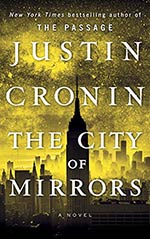
![]() Badseedgirl
Badseedgirl
5/27/2016
![]()
The year was 2010. The vampire fiction genre was still trying to recover from the horror that was the "Twilight Saga." In among these sparkly vampires came The Passage by Justin Cronin. The vampires in this novel had more in common with "Nosferatu" than with either Edward Cullen or Count Dracula. The Passage was followed in time by The Twelve, and now six years after we the reader were introduced to Amy and her intrepid bad of vampire hunters, this series comes to a shattering conclusion with The City of Mirrors.
I knew this novel was going to be a challenge from the start. Justin Cronin is not the easiest author to read. His tendency to play fast and loose with the flow of time can be a challenge to read. Chapters do not flow in a chronological order, jumping from before the viral outbreak, to 20 years after the events in the second book The Twelve, and then forward 1000 years after the outbreak. But because his world building and character development are surpassed by none, this reader at least is willing to wade through the chronological ping pong. Because I cared about the characters and the gloriously detailed world these characters inhabit.
Mr. Cronin must thoroughly enjoy playing fast and loose with his reader's emotion. All the major heroes in the story have tragic and heartbreaking back stories. In The City of Mirrors the reader is reintroduced to Timothy Fanning, patient zero of the outbreak. The author does a wonderful job of showing us how broken Mr. Fanning was before he was infected. I even started to feel sorry for him. **SPOILER** [And then he killed his former student] **SPOILER** All of a sudden, due to one action by Fanning most of the sympathy I had for him was yanked from me like the proverbial rug. Mr. Cronin goes on to further twist that sympathy to its breaking point with every action Fanning/Zero performs in the entire second half of the book.
As in the second novel in the series, there is a strong element of religion, or at least some kind of omnipotent presence guiding the actions of the characters. This should not dissuade the non-religious reader from this book. Left Behind this ain't. In fact, I would go so far as to say any evangelical who reads this book is going to be steaming mad by the ending. Even your basic Christian may find issue with the complete lack of devine retribution. **SPOILER** [Fanning dying and being able to spend eternity in his happiest memories.] **SPOILER**
The irony of this novel is that Justin Cronin tried his damnedest to give this a happy ending, and in general he succeeded. Because for him the afterlife appears to be for everyone. **SPOILER** [living in the memory that is happiest for the person.] **SPOILER** Humanity survives and flourishes, the heroes both living and dead are rewarded in the best way they can be, and the vampire virus is beaten back.
But because this is Justin Cronin, the one character who deserved peace and happiness is denied this reward. The final moments of this novel are perhaps some of the most bitter sweet pages I have ever read. When the final chapter was finished I set the book down and wept. I'll be honest, Mr. Cronin may have a hard time topping this series with his next book.
6 out of 5 stars (seriously, this book deserves more than 5 stars)